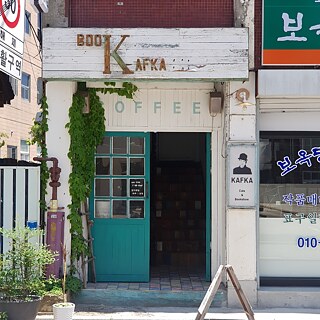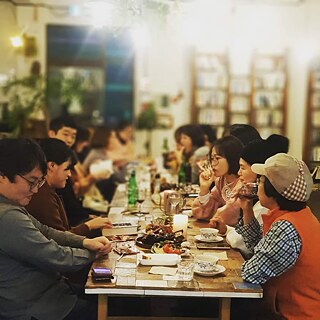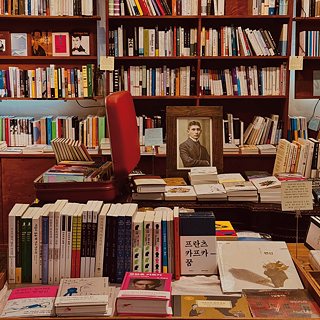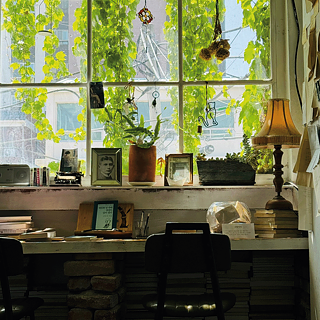A bookstore for Kafka
Please introduce yourself briefly.
Hello, I am Seong-hun Kang, the owner of Kafka Bookstore. Instead of focusing on my personal life, I'd like to provide more details about my work as a bookstore manager and my store. I established Kafka Bookstore in 2013, and it has been operational since then. Our goal is to create a literary-focused and creative space where people can read and write together.

At Kafka Bookstore, we host book clubs, with the oldest one being the Kafka Reading Circle, which has been running for about six years. It initially began as a group dedicated to reading all of Kafka's works and later expanded to explore the complete works of various authors, such as Borges. Currently, we cover a wide range of literary works and philosophy books.
We select books that may be challenging to read alone, and we also organize meetings where we can read and discuss each other's works. This not only aligns with my role as a bookseller but also reflects my love for reading.

Why did you give your bookshop the name “Kafka”?
Kafka is one of my absolute favorite authors. When I envisioned this space, I knew it had to bear the name of one of the literary greats, and Kafka stood out to me. I am truly honored to manage a space named after Kafka, and I am dedicated to making it a place that truly lives up to the literary legacy.And that's why this bookshop is named Kafka! Even if I didn't own a space called Kafka, I'd be drawn to a bookshop with that name. It feels so right that the name Kafka is tied to this bookshop.

Franz Kafka's novel “The Metamorphosis” is one of the most popular novels in Korea. What do you think is the reason?
The desire for transformation is a universal longing. We all yearn to break free from the status quo and embrace a better life. Kafka's transformation, though unconventional, has an undeniable appeal in its rejection of the norm. Nonetheless, it is popular in Korea likely because it embodies the potent energy of rejecting the current status quo. Kafka's transformation holds a revolutionary power. If K. had transformed into a useful shape-shifter, he might have continued his existing work. If not, he could have at least done something for his family. If he had become a dog, he could have been given the task of guarding the house or been sold for money. However, turning into a useless insect meant being entirely outside the existing order. It prompts us to question our value and ponder whether individual worth is solely determined by utility. Can't every living being, including a simple beetle, possess intrinsic value? Such questions are raised, particularly in Korean society, which is a competitive and borderless society where individuals must justify their value by being useful to survive. This is why I believe “The Metamorphosis” is so popular.What is your favorite quote from Kafka? And why?
I love the first sentence of every Kafka novel. When I read Kafka's first sentence, I feel like I'm entering a labyrinth. This labyrinth has a different exit each time, so the first sentence takes on a different meaning every time I read it.Kafka's novel “The Castle” begins with: “It was late in the evening when K. arrived.” The moment you read this sentence, you enter the castle with K. I follow the path that Kafka leads, but the landscape I find changes every time. Maybe it's because I'm getting older and my life and experiences have changed, but it's probably not just because of my personal experiences. Kafka is a writer who leads his readers into different landscapes and along different paths. That's why I think the first sentence of all Kafka novels is the best.
You are not only known as a bookseller but also as a novelist. If you were to rewrite the ending of “The Metamorphosis”, how would it end?
I've never considered reimagining the ending of “The Metamorphosis” a novel with a perfect ending. However, I'm now thinking about it for the first time. It strikes me that after “The Metamorphosis”, the younger sister should take her older brother's place. It's implied that she will now be the one to provide for the family and that she may even undergo a similar transformation into an insect-like her brother.I also believe it would be beneficial for the younger sister to realize that she has assumed her older brother's role. I hope she can break free from her parents and become independent. Perhaps the entire situation is a metamorphosis in itself. The ending of “The Metamorphosis” that I envision involves the younger sister transforming to liberate herself from her family and discover a new version of herself. I hope that her transformation doesn't make her reliant on the family, even if she does become an ineffective insect.
Apart from “The Metamorphosis”, what is your favorite novel by Franz Kafka? Or if you were to introduce a lesser-known novel by Franz Kafka, which one would you choose? Please give reasons for your choice.
I like the novel “A Hunger Artist.” Like most of Kafka's novels, it doesn't define life in any particular way. The art of fasting is celebrated by many, but over time it fades. Nevertheless, the artist does not stop starving. The reason for this is that he could not find food that suited his taste. We eat because we like it, we eat because we don't like it, we eat and we get on with our lives. The hunger artist, however, cannot.It is unlikely that the hunger artist fasts out of sheer stubbornness because if he does not eat, he will die. The hunger artist wants to seek and find food that suits his taste to break his fast. Just as we seek and find meaning in life until we die.
Food that suits one's taste can be the ultimate truth that a hunger artist seeks. Just as the hunger artist could not find it until his death, Kafka had not found it either. More important than the truth he could not find, however, is the desperate search for the individual artist who wanted to escape dying again and again. I think that the search for a dish that suits one's taste is a search for the truth. I thought that Kafka and the hunger artist were similar, and maybe my life was like that at times.

Do you have a message for readers who still love classic literature, including Franz Kafka's classic novel “The Metamorphosis”?
Classical literature is like people in many ways. If it had simply followed the current trends, it might have been challenging to read until the trends changed. I believe it endures beyond trends or the spirit of the times because, as I mentioned, it reflects human nature. I think the same can be said of Kafka's “The Metamorphosis”. It combines elements that change with those that remain constant. Literature tells numerous stories about lives in flux based on an unchanging human nature.In this manner, classic literature prompts us to ponder the fundamental aspects of life that are so familiar to us that we frequently overlook them. Good literature continues to ask us where these foundations lie, across different eras and through a variety of lives. It assists us in rediscovering them for ourselves, as we sometimes forget them. I encourage you to read classic literature occasionally, if not regularly, and to engage with the questions it raises.
